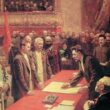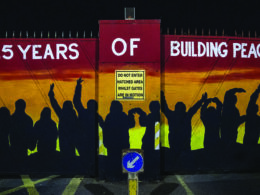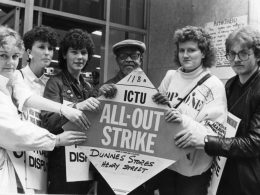By Eddie McCabe
The worldview of every mainstream economist and right-wing politician is predicated on the belief that people are motivated primarily by money, and therefore to them an economy that’s not based on profit-making is inconceivable.
Of course, in a capitalist economy if you don’t have money you don’t live, so it’s true that that incentive is always there. But is the pursuit of more money what drives people to do all the things they do? Well, no.
People do all kinds of wonderful and not-so-wonderful things with their limited time for reasons other than money. The fact that capitalism means investment only in areas where profit can be made, however, means that most people involved in things like art, music, science, politics, and sport have no choice but to pursue these interests without financial assistance.
In fact, millions of people work in jobs they have little interest in just to make enough money to get by, and develop their passions in what spare time they have left.
Even still, there are countless examples of people who devote their lives to projects or causes for little or no monetary return. Obvious examples include figures like Fr Peter McVerry or Greta Thunberg. The main reward for these people is that they are in their own way helping people or the environment.
Similarly, non-profit institutions like Wikipedia — the fourth most visited website in the world — show what can be produced by (mostly) volunteers.
But it goes deeper. Recent studies (commissioned not by socialists, but the Federal Reserve Bank of Boston) suggest that money is a good motivator when it comes to straightforward, mechanical tasks, and offering monetary rewards for such work results in higher productivity — but that’s where it ends. When it comes to more complicated work that requires skills and creativity, monetary rewards no longer produce the same results, and if anything have a negative impact.
Once people don’t have to worry about money, they can begin to focus their energies, talents, and abilities. What actually motivates people in the workplace are three other factors: autonomy, mastery, and purpose. That means: 1) having some control over their working lives; 2) developing their skills to the fullest potential; and 3) doing meaningful things that make a difference.
Life for most workers under capitalism is 40-odd mind-numbing hours of drudgery under the dictatorship of a manager, with anxiety about job security and financial woes to boot. Only a lucky minority ever experiences autonomy, mastery, or purpose in their jobs.
As far as innovation goes, there’s a very real disincentive under capitalism to find more efficient ways of working, because it won’t mean better pay or less work — it will eventually mean fewer jobs for workers.
Just think of the breakthroughs we’d have made if things were the other way around. Think of the potential we would unleash if people’s basic needs — hunger, shelter, security — were guaranteed and they didn’t have to worry about merely surviving, which is what most people’s money today is spent on.
In a socialist economy, based on public ownership and democratic planning of the wealth, resources, and industry in society under workers’ control, the alienation of work under capitalism could be eradicated. The necessary menial work could be shared out to allow everyone to pursue lives — with considerably more leisure time — and work in which they can contribute to the collective advancement of society, as well as themselves as individuals.












